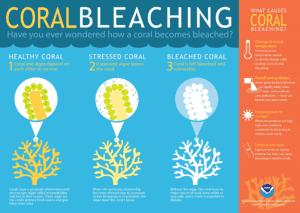TAG: GS 3: ECOLOGY AND ENVIRONMENT
THE CONTEXT: The Great Barrier Reef (GBR), a UNESCO World Heritage site, is facing a severe crisis as the Australian authorities confirm a widespread coral bleaching event.
EXPLANATION:
- The implications are dire, with experts noting the potential for a fourth global mass coral bleaching, driven by high ocean temperatures attributed to climate change.
- Aerial surveys jointly conducted by the Reef Authority and the Australian Institute of Marine Science (AIMS) reveal alarming statistics.
- Over two-thirds of the GBR Marine Park, spanning an area larger than Italy, is affected.
- The bleaching has spread across 300 inshore, midshelf, and offshore reefs, signaling a significant threat to the diverse ecosystem.
- Reef Authority Chief Scientist emphasizes that survey results align with patterns of prolonged heat stress during the summer.
- Shallow water coral bleaching is prevalent, and there are reports of corals already dying, particularly in the southern GBR.
- The alarming temperatures, with some coral sites reaching 29 degrees Celsius, the warmest in two decades has been highlighted.
Impact on Coral Reefs:
- The climate change poses a greater threat to the GBR and other global coral reef ecosystems.
- The current bleaching event follows a series of alarming incidents globally, with coral reefs reporting bleaching in the Northern Hemisphere due to rising sea surface temperatures accelerated by El Nino conditions.
Resilience and Recovery:
- While the GBR has shown resilience in the face of past coral bleaching events, there are concerns about the prolonged and intense nature of the current heat stress.
- Reef Authority Chief Scientist acknowledges the reef’s ability to recover from extreme events but warns that prolonged or intense heat may prove fatal to corals.
Historical Context:
- This marks the fifth coral bleaching event in the past eight years, following incidents in 1998, 2002, 2016, 2017, 2020, and 2022.
- The current situation is particularly alarming given its frequency and the Earth’s vulnerability to a potential fourth global mass coral bleaching event.
- The coral bleaching indicates a stress response, with recovery depending on the intensity and duration of heat stress.
- However, prolonged or intense heat poses a severe threat.
- Combining aerial and in-water surveys is essential to assess the severity and actual impact on deeper areas of the reef.
Global Context:
- The National Oceanic and Atmospheric Administration (NOAA) highlights the severity of the third global coral bleaching event between 2014 and 2017, the longest and most damaging on record.
- The Coral Reef Watch program issues a warning that the Earth is on the brink of a fourth global mass coral bleaching event, with reefs in the Indian, Pacific, and Atlantic oceans showing severe signs of bleaching.
Coral bleaching:
- When corals are stressed by changes in conditions such as temperature, light, or nutrients, they expel the symbiotic algae living in their tissues, causing them to turn completely white.

- Warmer water temperatures can result in coral bleaching.
- When water is too warm, corals will expel the algae (zooxanthellae) living in their tissues causing the coral to turn completely white.
- This is called coral bleaching. When a coral bleaches, it is not dead. Corals can survive a bleaching event, but they are under more stress and are subject to mortality.

